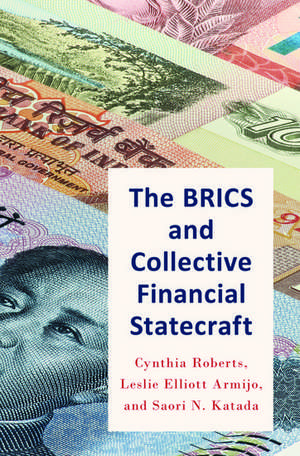The BRICS and Collective Financial Statecraft
Autor Cynthia Roberts, Leslie Armijo, Saori Katadaen Limba Engleză Paperback – 7 dec 2017
| Toate formatele și edițiile | Preț | Express |
|---|---|---|
| Paperback (1) | 267.71 lei 31-37 zile | |
| Oxford University Press – 7 dec 2017 | 267.71 lei 31-37 zile | |
| Hardback (1) | 702.15 lei 31-37 zile | |
| Oxford University Press – 7 dec 2017 | 702.15 lei 31-37 zile |
Preț: 267.71 lei
Preț vechi: 310.92 lei
-14% Nou
Puncte Express: 402
Preț estimativ în valută:
51.23€ • 53.18$ • 42.72£
51.23€ • 53.18$ • 42.72£
Carte tipărită la comandă
Livrare economică 11-17 martie
Preluare comenzi: 021 569.72.76
Specificații
ISBN-13: 9780190697525
ISBN-10: 0190697520
Pagini: 288
Dimensiuni: 231 x 155 x 18 mm
Greutate: 0.45 kg
Editura: Oxford University Press
Colecția OUP USA
Locul publicării:New York, United States
ISBN-10: 0190697520
Pagini: 288
Dimensiuni: 231 x 155 x 18 mm
Greutate: 0.45 kg
Editura: Oxford University Press
Colecția OUP USA
Locul publicării:New York, United States
Recenzii
This book provides an authoritative, comprehensive, and lucid account of the rise of the BRICS. A compelling narrative about how a group of economies, which have some congruent interests but are simultaneously competitors in many other areas, have set aside their differences and come together as a force to reckon with in global finance.
Here is a book that sceptics of the BRICS must read. Through careful and nuanced analysis, the authors show why no serious analyst of global financial governance can ignore this grouping any longer.
Daniel McDowell's book, Bucking the Buck: US Financial Sanctions and the International Backlash against the Dollar, makes a revelatory contribution from the US' perspective built upon meticulous case assessments and empirical analyses.
Here is a book that sceptics of the BRICS must read. Through careful and nuanced analysis, the authors show why no serious analyst of global financial governance can ignore this grouping any longer.
Daniel McDowell's book, Bucking the Buck: US Financial Sanctions and the International Backlash against the Dollar, makes a revelatory contribution from the US' perspective built upon meticulous case assessments and empirical analyses.
Notă biografică
Cynthia Roberts is Associate Professor of Political Science at Hunter College, CUNY; Senior Associate at the Saltzman Institute of War and Peace Studies and Adjunct Associate Professor of International Affairs at Columbia University. Her research focuses on the BRICS, international power shifts, and the liberal world order, and the strategies of major powers. She received her M.A., M.Phil. and Ph.D. from Columbia University and Certificate from the Harriman Institute.Leslie Elliott Armijo teaches Political Economy and Development at the School for International Studies, Simon Fraser University, and has held Visiting Professorships in Brazil (2015) and Germany (2011). She investigates the politics of national and international economic policymaking, and their relationship to democratic consolidation, especially in Brazil, India, and large emerging economies. She holds degrees from Cornell University (B.A.) and the University of California, Berkeley (Ph.D).Saori N. Katada is Associate Professor at School of International Relations at University of Southern California. Katada is the author of several books and numerous articles on trade, financial and monetary cooperation in East Asia and foreign aid. She has her Ph.D. from the University of North Carolina at Chapel Hill (Political Science) and B.A. from Hitotsubashi University (Tokyo). Before joining USC, she worked at the World Bank (Washington D.C.), and the UNDP (Mexico City).
